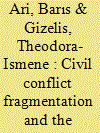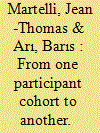| Srl | Item |
| 1 |
ID:
174762


|
|
|
|
|
| Summary/Abstract |
While the extant literature has highlighted the importance of UN peacekeeping operations (PKOs) in addressing commitment problems in civil wars, actor fragmentation presents additional challenges for conflict resolution. A higher number of competing actors not only worsens coordination problems but also aggravates the risk of opposition to a peace process, generating an environment prone to spoiler violence. This article argues that UN interventions matter more when commitment and coordination problems are worse, which corresponds to known traits of fragmented conflicts. Using data on civil conflict duration and intensity, we present evidence that UN PKOs are effective at mitigating adverse impacts of fragmentation. Fragmented conflicts are both longer and deadlier when the UN is not involved to support a peace process, while UN peacekeeping mitigates the effects of fragmentation.
|
|
|
|
|
|
|
|
|
|
|
|
|
|
|
|
| 2 |
ID:
160687


|
|
|
|
|
| Summary/Abstract |
Several recent studies propose that political choices of Indian youth can hardly be distinguished from those of their parents in many respects. Contrary to this well-established understanding, this article shows that when set apart from the spheres of family and work, students in a flagship Indian university—mostly in the social sciences and humanities—gradually transform their political attitudes in light of prolonged exposure to a campus environment. Through combining ethnographic study with the analysis of a survey of political attitudes of Jawaharlal Nehru University (JNU) students, we show that time spent in situ fosters participation to political activities, increases chances of joining a student organization and make students more likely to identify themselves as politically radical. The class and caste background of students, on the other hand, are not strongly associated with political attitudes, showing the integrative nature of politicization on the JNU campus.
|
|
|
|
|
|
|
|
|
|
|
|
|
|
|
|